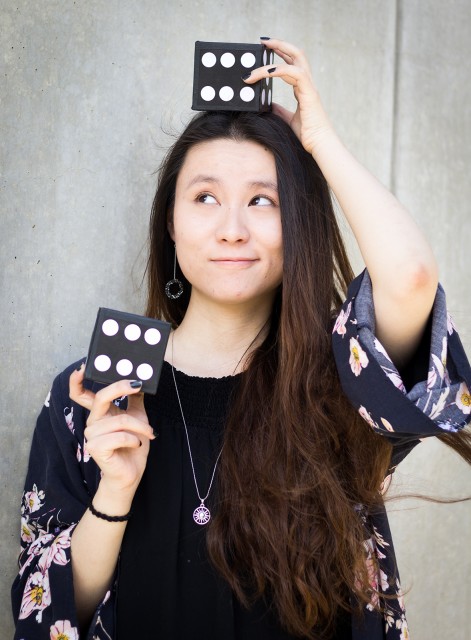Mahjong will be the key to preventing the apocalypse in “The Lucky One.”
Four goddesses, who reign over love, death, wealth and fertility, will play a never-ending round of the Chinese board game in the comedic film. “The Lucky One,” which finished shooting April 7, will be screened in Melnitz Hall on June 12.
In the film, a rich playboy, played by graduate animation student Kuozheng Hao, wishes to become a god. The apathetic goddesses, seeking distraction from their humdrum existence, decide to grant him his wish.
The cast for “The Lucky One” is comprised entirely of Chinese international students, and Hao said influences from Chinese culture are visible in many facets of the film.
“It’s not westernized or (based on) Buddhism or anything like that. … (The story) is picked out from the traditional Chinese Gothic stories,” Hao said.
[RELATED: Lunar New Year festival expands to feature culture of more East Asian nations]
Hao said his character Ren Min’s name is a detail in the film that can be traced back to Chinese influences. Ren Min is a wealthy man who has enjoyed all human luxuries and now wants to live the life of a god, Hao said. Ren Min’s name sounds very similar to the Mandarin word for “people,” and Hao said this could be a symbol for Ren Min’s role as the only human in the film.
On a more apparent note, mahjong is a main component of the film that expresses Chinese culture, Hao said. Mahjong is a Chinese gambling game that requires four players and is similar to poker. The goddesses in the film play mahjong round after round without stopping and only grant a human’s wish once per year. Hao said the game’s circular flow is reminiscent of the philosophy of cyclical time. Though mahjong’s presence in the film can be interpreted as a metaphor for the monotonous flow of time, writer and director Yichi Zhang, a graduate student, said it also places a comedic spin on the goddesses by making the all-powerful characters experience the same boredom as humans.
“All we do is play mahjong all day and night without eating or sleeping. That’s our job, and that’s our life – it’s very boring,” said Shenli Zhao, a graduate acting student who plays the goddess of death.
Influences from Chinese culture also play into the goddesses’ costumes. Zhao said each of the goddesses is ordained in a qipao, a traditional Chinese dress that is form-fitting with a high neckline. The color of each goddess’ dress corresponds to her given power, Zhang said, with the goddess of death wearing black, and the goddess of love donning bright pink.
While the set design does not emphasize the Chinese inspirations behind the film, Zhang said it highlights the theme of luck. The goddesses live inside a large, inward-facing die, and Zhang said their mahjong table is actually a pip on a face of the die’s side. Zhang said there are also smaller dice placed throughout the set to represent the importance of luck. Decorations in the background highlight the roles of each goddess: skulls and shackles to represent death alongside piles of money to represent wealth.
In addition to the details nodding to Chinese themes within the film, most of the cast and crew members have a strong connection to Chinese culture. While the film’s primary language is Mandarin, Zhao said there will be English subtitles added. Zhao said the entire cast and 60% of the crew members are fluent in Mandarin.
“I’m very happy to see that a film about our culture is being made in this country. I’m very proud of them and proud of ourselves,” Zhao said.
[RELATED: Sounds of Schoenberg: The Chinese dizi]
Though the film has Chinese influences, Zhang said its message can be universally applied to all cultures. During her initial conceptualization of the story, Zhang said the characters spoke English, and the goddesses played bridge instead of mahjong. She chose to switch the film to Mandarin to broaden her directorial range, Zhang said.
“I think the core of the story is really universal,” Zhang said. “It doesn’t belong specifically to one culture.”

